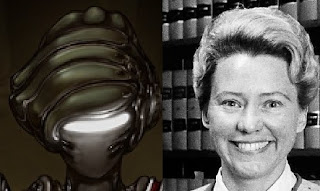In my last post about the muses that inspired me in writing and designing Primordia, I talked about my great-aunt Virginia, whose influence on me began when I was a baby. I didn’t meet the second muse, Judge Pamela Ann Rymer, until I was in my 20s.
For lawyers on a certain career path, clerking for a judge serves as a kind of “finishing school” before the actual practice of law begins. It’s seen as a chance to “see how the sausage gets made”; to disabuse oneself of idealistic naivety and learn the practical reality of what wins or loses cases. But for me, clerking was the opposite—it inspired, rather than quashed, idealism. And the reason was Judge Rymer herself, whose tireless service to the law sowed the seed from which Primordia’s character Clarity sprang, something recognized in one of the very first previews of the game.
 |
| The old flip the hair trick! |
Pam Rymer was born in Knoxville, Tennessee in 1941. She graduated from Vassar College in 1961 (two years younger than is typical) and enrolled in Stanford Law School. She eventually became one of its “most revered alumni,” but at the time she stood out for being one of just a handful of women students. Even a decade later, only 13% of the student body was female. Then and there, as at other times and other places, being brilliant was no answer to bias. In seeking a job at a major Los Angeles firm, she was told she was truly exceptional among all applicants… but all the same, no exception would be made to the all-male hiring policy. So she went elsewhere, and soon became the first woman law partner at the firm she joined. Joining a client and another partner for lunch at a private club, she was told to take the service elevator; women, after all, could not ride in the members’ elevator. But her will was unbreakable and her commitment to the law unshakeable. She firmly believed that individual grit and determination were what mattered, and in her case, she was right. In 1983 she was appointed as a federal judge and in in 1989 she was elevated to the Court of Appeals.
 |
| Entry to the Ninth Circuit courthouse. |
 |
| Orange you glad we changed the palette? |
When I applied to work for Judge Rymer, she had been on the bench for over twenty years. In my job interview, the first thing she asked about was video games, since my resume included my work for TimeGate and Bioware while in law school. The judge didn’t have kids of her own, but her god-daughter was a gamer, and she was intrigued by the idea that games could have stories. We spent an hour on the subject, which we’d come back to many times over the years.
As I’ll explain, Judge Rymer’s exemplary character and jurisprudence were the biggest source of her influence on Primordia. But her curiosity about my work writing and designing games played an important role, too.
After I worked for Judge Rymer, I spent a second year clerking, this time at the Supreme Court. One day, Justice Sandra Day O’Connor, who had retired but still kept chambers at the Court, invited me to stop by. She had heard from her “friend Pam” that I “designed video games.”
Justice O’Connor wanted to design a video game herself, she said, to help kids learn civics. She felt that we needed games that provoked discussions about law, government, rights, and justice. She allowed that she had never played video games herself, and interrogated me at length on the subject. To my surprise, three years later, she founded iCivics ”with the goal of transforming civic education for every student in America with innovative, truly engaging games and resources.” Any doubts about the commitment of a septuagenarian rancher-turned-jurist becoming a septuagenarian game designer as her last act proved wrong. This was just one more barrier for her to break.
It was Judge Rymer who set in motion the odd series of events that ended with Justice O’Connor’s insistence that games must provoke and engage with our core civic values. That lesson stayed with, and has guided my design and writing on the games I’ve worked on since. It’s one reason why (for better or worse) I stayed with my vision for Primordia’s story and rejected my teammate’s suggestion that we replace its “technical and political” conflicts with a “simple and emotional” “rescue the princess storyline.”
And beyond this, Judge Rymer directly influenced Primordia’s characters, as well as its locations and puzzles.
One of the game’s most memorable characters is Clarity Arbiterbuilt, “law clerk to Arbiter, judge of Metropol.” Though Clarity was born from many influences (including another judge, Judge Dredd, and Vhailor from Planescape: Torment), the heart of the character came from Judge Rymer.
Let me caveat this right away: Judge Rymer was rightly remembered for being “quick to laugh and to smile” and rightly renowned for her “sense of humor” (described by one judicial colleague as “playful” and another as “wicked”). She was quirky—having pranked a law partner by hiding a live frog in his desk, she eventually came to own a vast collection of frog paraphernalia. She was an avid tennis player and a lover of college football and corndogs. None of these qualities, nor her mentorship of young lawyers, are present in Clarity.
But as one of her closest friends on the bench wrote, “Finding the right answer … and doing the law correctly were foremost in her mind in every matter.” Justice was the destination to be found; the law, the roadmap to be followed. This “foremost” characteristic is likewise at the heart of Clarity. And while Judge Rymer would never have said “mercy is malware” (as Clarity does), her first real job was working on the presidential campaign in which Barry Goldwater uttered his (in)famous line that “moderation in the pursuit of justice is no virtue.” And as a judge, her sternness in applying the law had yielded the nickname “Penitentiary Pam.”
As much as she revered the law, she also revered the facts. In Primordia, Clarity admonishes Horatio not to “characterize the evidence.” This came straight from Judge Rymer—her clerks were not to argue the facts, let alone shade the facts. We were to study the facts and report them. To those facts, the law was to be applied impartially and implacably. Just as Clarity ultimately concludes that Horatio has no legal claim against Scraper (despite Clarity’s loathing of MetroMind), so too did I watch Judge Rymer refuse to rule against “bad guys” when the facts and the law could not support a claim. Those proven guilty had no reason to expect mercy; but those who had not been proven guilty according to the law and the evidence could be confident in impartial justice.
If Clarity had “strength, indomitable spirit, and an incredible work ethic,” that was because Judge Rymer was her model; if Clarity was a “brilliant jurist and a loyal friend,” that was again because Judge Rymer was her model. These were qualities praised in the judge after she passed away from cancer, having worked to very end in the cause of justice.
For obvious reasons, the experience of serving as a law clerk to Judge Rymer shaped not Clarity but also Clarity’s co-clerk (and sister) Charity, and their dynamic with Metropol’s judge, Arbiter. Arbiter’s casual condescension toward Clarity (and, indeed, MetroMind) had nothing to do with my own experience as a law clerk—but it reflected the experiences Judge Rymer recounted to me of the headwinds she had sailed into as a lawyer.
.jpg) |
| Horatio appears before Arbiter Manbuilt in the courthouse. |
All this is to say that not only key characters in Primordia, but also key story beats (such as the struggle for control of Metropol), key areas (such as the courthouse and Clarity’s island), key puzzles (such as the legal dispute between Oswald and Cornelius), and a core theme (the dialectic among law, mercy, and justice) all owe a debt to Judge Rymer. I couldn’t have created any of those things without the time I spent working with her.
My writing itself also owes a debt to Judge Rymer. She was superb writer who was known for her “unparalleled ability to cut to the core of a legal issue and resolve it in a succinct gem of an opinion.” I’ve said before that legal writing influenced my game writing, and vice versa. And she was quite a teacher of legal writing. Over the course of the year, she drilled into us the need to start by reading everything we could, and then distill it down as much as possible. That kind of broad research was key to Primordia (and Strangeland and Fallen Gods). I can’t bring myself to shed ornamentation the way she did. But her lessons about revision, pacing, and punchiness were all things that I used on Primordia (and the games I worked on since).
The judge knew about Primordia while I was writing it. While she had no personal interest in computer games or science fiction (her one speculative-fiction vice was Harry Potter), she was—as one obituary noted—“a tremendous mentor and lifelong friend of her clerks.” So she checked in on my work as a lawyer, my hobby as a writer, and most of all, my daughter (a partial namesake of the judge’s), who had been born just before we started developing Primordia. But, alas, I didn’t tell her about Clarity, Charity, and Arbiter, or about solving legal puzzles and adjudicating science-fictional lawsuits. In a mistake I have made too often, I wanted to show her our game, which I was confident we would finish soon. I knew about the disease my friend was fighting, but I also knew she was indomitable.
She was. But her body was not, and she shed its burden on September 21, 2011. Nevertheless, her soul still fills the world, the law, and the hearts of the myriad lawyers she mentored and inspired. And though she died a year before Primordia was finally complete, her soul fills its world and characters, too.


.jpg)
.jpg)
